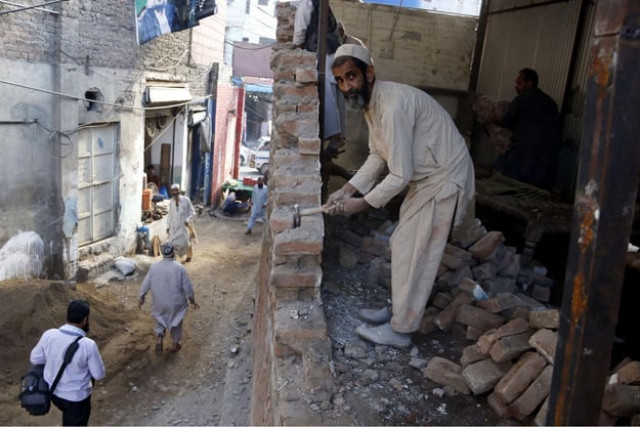Picking up the pieces, starting with scraps
Government officials fear relief efforts might be impeded by political tug-of-war

Government officials fear relief efforts might be impeded by political tug-of-war. PHOTO: ONLINE
A few weeks ago, we commemorated the tenth anniversary of the October 8, 2005 with questions and complaints. A series of press releases and statements from politicians came pouring in over how successive governments have failed to rebuild damaged infrastructure. However, after tremors rocked the country on October 26, 2015, we will once again put our heads together to determine how to cope with the destruction.
At this stage, we do not have exact figures of casualties. All we have are estimates of death tolls, injuries and damage to infrastructure and home. We must also remember heavy flooding lashed Khyber-Pakhtunkhwa in July and August, killing over 115 people and damaging more than 800 houses.
The provincial government has amended its compensation policy due to natural calamities and terrorism. However, the question we are bound to ask is: how much economic strain the government take?
The argument is complicated further when we examine it against the backdrop of restrictions imposed on NGOs in the province and a countrywide crackdown against humanitarian organisations. Political overtures made by Pakistan Tehreek-e-Insaf and Pakistan Muslim League-Nawaz and their willingness to constantly make comparisons have also made matters worse.
Things have moved in the right direction so far and the catastrophe got what appears to be an effective response. The prime minister pledged to join hands with Chief Minister Pervez Khattak to provide assistance to the affected population and provide relief.
There are certain elements on both sides who want to sabotage these collective efforts in the interest of larger political gains. Ministers and government officials fear relief efforts might be impeded by a political tug-of-war.
We can only hope that this premonition is incorrect. However, we must remember natural disasters and previous incidents of terror have also been widely politicised.
Over the past few months, more and more people in K-P and Fata have become homeless. The government’s first priority should be to provide shelter and food and then to rebuild intelligently – with preventive measures.
Since a large fraction of the destruction has taken place in the mountainous parts of Malakand Division and northern areas, the harsh winters would be a test of governance and disaster management for the government.
The lessons learnt from the earthquake in 2005 should be enough to highlight the mistake made back then. It is about time to set aside our political biases and make a difference. Although the damage has been done, only a strong leadership can undo its effects.
However, as the Hegelian apothegm goes, “we learn from history that man can never learn anything from history.”
Published in The Express Tribune, October 28th, 2015.













COMMENTS
Comments are moderated and generally will be posted if they are on-topic and not abusive.
For more information, please see our Comments FAQ